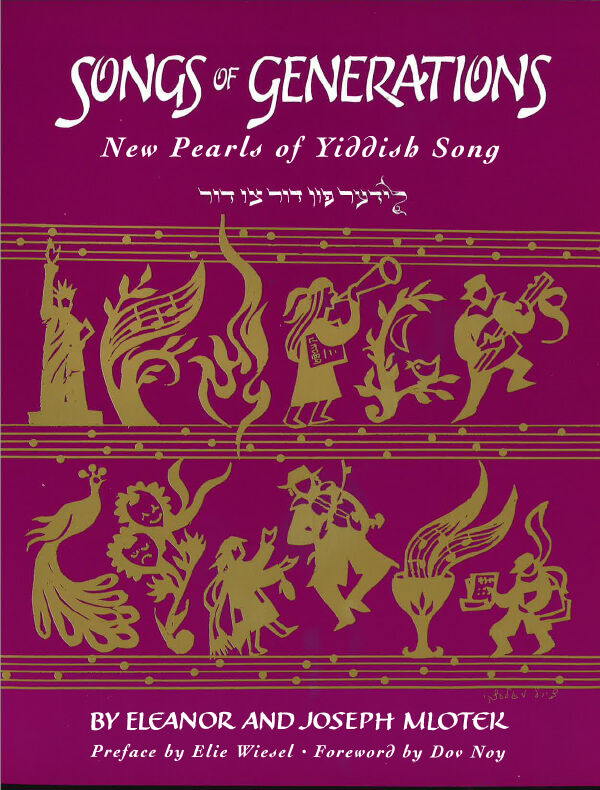Words by Vilna poet-partisan Shmerke Kaczerginsky (1908-1954), written in 1926. The song was popular in Europe and the U.S. in the 1930s. It was published as an anonymous song by A. Bitter in 1940. In the Memorial Book for S. Kaczerginski (Shmerke Katsherginski-ondenk-bukh), 1955, writer Moishe Knapheis describes in his article “Di freydik lid” (The Joyful Song), how the song “rolled through the Jewish towns of Poland like a golden coin from all the poor homes and workers’ locals, cellars and garrets, from everywhere, the joyful singing spread, trilled out by young, thin little voices.”

Fathers, mothers and little children
are building barricades.
Patrolling the streets,
are the worker brigades.
Father has left the house
early for the factory.
To the house, he will not
come back today.
The children know well
their father will not come.
Today, in the street, Father
is busy with his rifle.
Mother has also gone away
to sell apples in the street,
In the kitchen, like orphans,
stand the plates and the pot.
“There won’t be any supper,”
Khanele tells the lads,
because Mother is off
to help our father.
Suddenly–bang! A bullet
came into the house,
flew past Khanele,
and buried itself in the wall.
“If that’s how it is,” says Khanele,
“children, come with me!
Motye, take the big basket,
Meyerke, the door.
“The drawers from the dresser,
and an old barrel.
We’ll make a barricade
in the middle of the street.”
The barricade erected,
no one is in the house.
The police run past,
the children throw stones.
Who cares about supper
when cannons are roaring,
The children of the house
are helping their mother and father.
Fathers, mothers and little children
are building barricades.
Patrolling the streets, are
the worker brigades.
Tates, mames, kinderlekh
Boyen barikadn,
Oyf di gasn geyen arum
Arbeter-otryadn.
S’iz der tate fri fun shtub
Avek oyf der fabrik,
Vet er shoyn in shtibele
Nit kumen haynt tsurik.
S’veysn gut di kinderlekh,
Der tate vet nit kumen,
S’iz der tate haynt in gas
Mit zayn biks farnumen.
S’iz di mame oykh avek
In gas farkoyfn epl,
Shteyen in kikh faryosemte
Di teler mitn tepl.
— S’vet nit zayn keyn vetshere –
Zogt Khanele di yatn, –
Vayl di mame iz avek
Tsuhelfn dem tatn. . .
Plutsling—trakh! a pule iz
Arayn in kleynem shtibl,
Farbaygefloygn Khanelen,
Gemakht in vant a gribl.
– Oyb azoy—zogt Khanele –
– Kinder, kumt mit mir!
Motye, nem di groyse korb,
Meyerke—di tir.
Di shuflodn fun kamod,
Mit an altn fas,
A barikade shteln mir
Oyf in mitn gas.
Di barikade oyfgeshtelt,
In shtibl nito keyner,
Loyfn politsey farbay,
Di kinder varfn shteyner.
Vos mir, ven mir vetshere,
Es dunern harmatn,
Di kinderlekh fun shtibele
Helfn mamen-tatn. . .
Tates, mames, kinderlekh
Boyen barikadn,
Oyf di gasn geyen arum
Arbeter-otryadn.
טאַטעס, מאַמעס, קינדערלעך
בױען באַריקאַדן,
אױף די גאַסן גײען אַרום
אַרבעטער-אָטריאַדן.
ס’איז דער טאַטע פֿרי פֿון שטוב
אַװעק אױף דער פֿאַבריק,
װעט ער שױן אין שטיבעלע
ניט קומען הײַנט צוריק.
ס’װײסן גוט די קינדערלעך,
דער טאַטע װעט ניט קומען,
סיאיז דער טאַטע הײַנט אין גאַס
מיט זײַן ביקס פֿאַרנומען.
ס’איז די מאַמע אױך אַװעק
אין גאַס פֿאַרקױפֿן עפּל,
שטײען אין קיך פֿאַריתומטע
די טעלער מיטן טעפּל.
— ס’װעט ניט זײַן קײן װעטשערע –
זאָגט חנהלע די יאַטן, –
װײַל די מאַמֶע איזּ אַװעק
צוהעלפֿן דעם טאַטן. . .
פּלוצלינג – טראָך! אַ פּולע איז
אַרײַן אין קלײנעם שטיבל,
פֿאַרבײַגעפֿלױגן חנהלען,
געמאַכט אין װאַנט אַ גריבל.
— אױב אַזױ – זאָגט חנהלע –
— קינדער, קומט מיט מיר!
מאָטיע, נעם די גרױסע קאָרב,
מאירקע – די טיר.
די שופֿלאָדן פֿון קאַמאָד,
מיט אַן אַלטן פֿאַס,
אַ באַריקאַדע שטעלן מיר
אױף אין מיטן גאַס.
די באַריקאַדע אױפֿגעשטעלט,
אין שטיבל ניטאָ קײנער,
לױפֿן פּאָליצײ פֿאַרבײַ,
די קינדער װאַרפֿן שטײנער.
װאָס מיר, װען מיר װעטשערע,
עס דונערן האַרמאַטן,
די קינדערלעך פֿון שטיבעלע
העלפֿן מאַמען-טאַטן. . .
טאַטעס, מאַמעס, קינדערלעך
בױען באַריקאַדן,
אױף די גאַסן גײען אַרום
אַרבעטער-אָטריאַדן.
Song Title: Barikadn

The Songs of Generations: New Pearls of Yiddish Song anthology comprises songs that were either never printed before or appeared in rare and inaccessible publications — sometimes in different versions and without proper sources. Most of the songs in this book were submitted by readers of Chana and Yosl’s column “Perl fun der yidisher poezye” (Pearls of Yiddish Poetry) in the Yiddish newspaper Der Forverts (The Forward), initiated in October, 1970. Over 25 years, thousands of songs were collected in correspondence and on cassettes from readers throughout the world, and they represent a veritable national Yiddish song archive. Chana Mlotek, in her introduction, writes, “In the course of years the inquiries, contributions and enthusiasm of these readers have kept our own interest unflagging and have reinforced our dedication to this effort. And in recent years our participants have also been augmented by new readers from the former Soviet Russia, who receive our newspaper there or from newly-arrived immigrants in this country and Israel.”